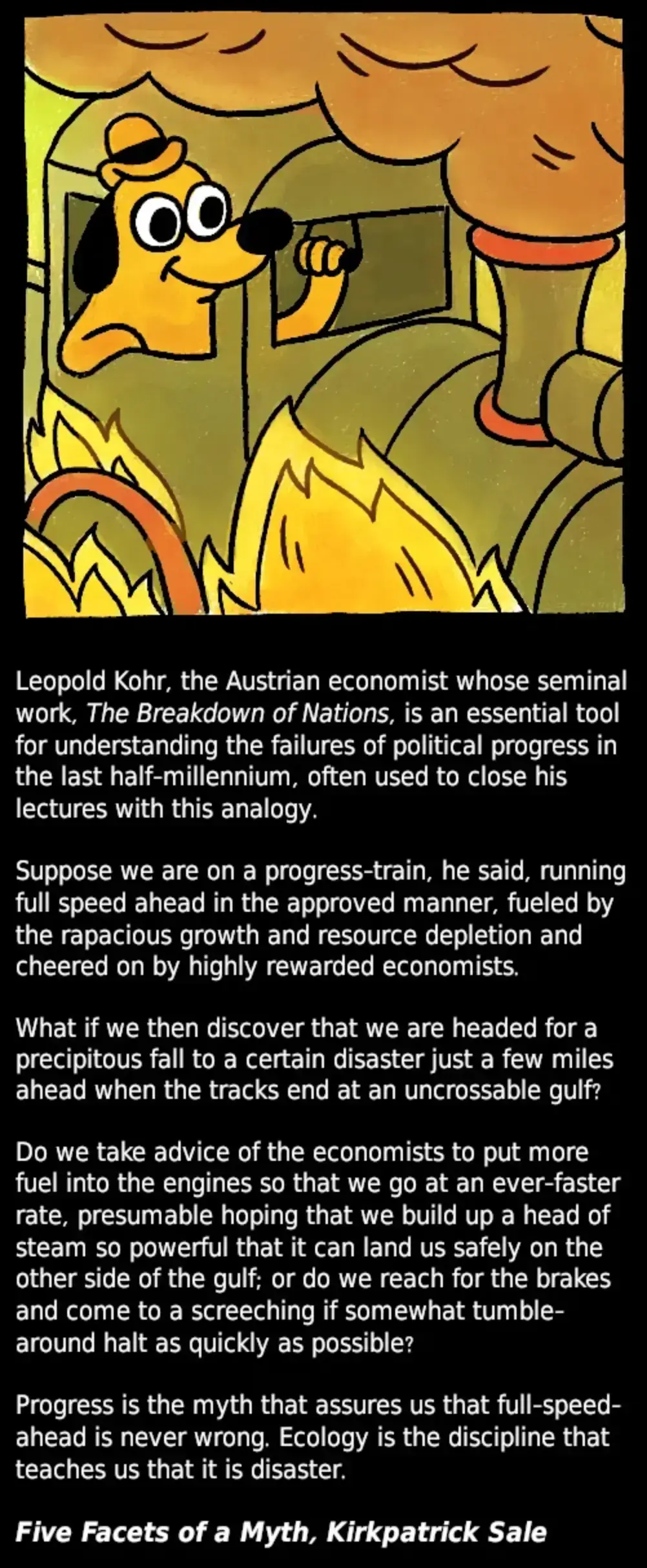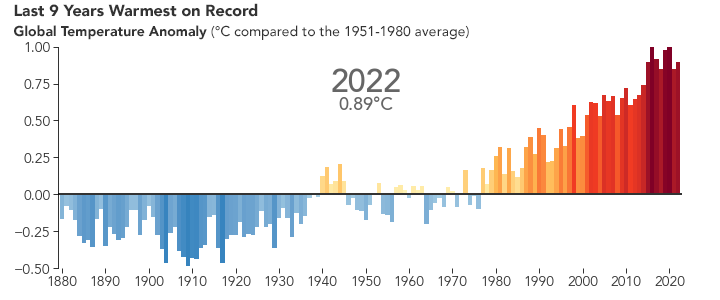Data from Climate Reanalyzer says that daily sea surface temperatures for January 2024 are higher than they were in January 2023.
Could be but we would need to see way more data to come to that conclusion
What we can tell is that the top 10 hottest years since 1880 have been the last 10. And 2023 was quite hot even by comparison to the others in the list.
Accelerating or not we do need to slow our emissions down a fuck ton or we’re going to destroy ourselves
To put into context how hard we need to put on the brakes: greenhouse gas emissions are at an all time high and increasing year over year.
So not only aren’t we decreasing the amount of greenhouse gasses in the atmosphere and thus fixing our problems, we aren’t even decreasing the rate at which we’re making the problem worse. We’re just piling on more problems at record pace.
Humanity is heading for the scene of the accident and instead of stopping, or even braking, we’re pushing the accelerator down more.
Wheee!


Man… I never complained about Winter, I actually love everything about it; the cold, the wind, the hoarfrost, the blizzards, the ice storms, the freezing rain, even the brown slush on the road. However, nowadays snowfalls have become thinner and thinner or even just raining instead and melting away whatever little snow had accumulated. It’s sad.
On the other hand, Summer, I turn into a lazy Grinch that avoids the heat and the Sun as if I was a human snowman.
Everytime I see that graph, beyond the constant reminder of the hyperobject that is Climate Change, I am anticipating the dread of a even more scorching summer on its way in a few more months. On top of that, I also have take forest fires in consideration and prepare air filters and/or n100/n95 masks and replacement cartridges for myself, family and older relatives.
It is sad to see we still, all considered, have not yet even begun to lower emissions and will probably continue to argue over keeping the status quo for as long as possible until maybe, unfortunately, entire cities are regularly assailed by amplified natural and man-made disasters in back-to-back sequence and until everyone is affected directly or indirectly by those irreversible damages.
(Reposting my same reply to an identical post as this one regarding daily sea surface temperature; you can check my post history)
And even if we were to stop right now, the effect wouldn’t really be felt for another twenty years. We are currently experiencing the effects from 2004.
We do have a pretty strong el Niño exacerbating the effects, but yes, generally it seems something has tipped and the heating is accelerating. The last 5 years have been pretty brutal, and they are only the first appetizer of what’s to come
Almost reminds me of falling. There’s that first first 1/8th of a second where you are just beginning to realize you are falling, and in the next 1/8th of a second you are gone and there is no coming back.
With been in a 5+ sigma event, ongoing, since what, like, June? July? In November, when we would expect the annual global low to occur, we were outside of 2 sigma from what we would expect for the annual global high. In other words, our expected annual low was higher than our expected annual high, by a lot.
Kind of makes you wonder if the ‘hot model problem’, isn’t really a data issue not a model issue.
Here’s a pretty harrowing video from Sabine about why global warming might be happening faster than we predicted. Basically, we were comparing our models against historic geological data, but the different atmospheric composition for cloud formation at that time may have been unaccounted for, meaning the climate sensitivity (how much co2 effects global temperatures) is likely higher than we were estimating.
Yeah, this winter has been fucked. It might be the exception and one year doesn’t establish a trend, but… We’ve been ~15°C above seasonal averages…
While it is possible we hit an unknown and unmodeled tipping point, until we get conformation as to what caused the vast shift in the last year it’s still possible it is temporary and we’ll fall back down to the temperature increases we’ve seen up until this point.
Not that it really matters, seeing as what we need to be done doesn’t change with how high it gets.
Doesn’t help that El Niño is currently in effect, with the next several seasons predicted to be affected by it. Muddies the data, so to speak.
Yeah, but some of those previous years had El Niño too and they’re waaaay down below the 2023 and 2024 lines.
Precisely. A lot of them! El nino is not rare
It’s very much the case that El Niño is affecting our perception right now, but La Niña is believed to be making a comeback in a few months.
Then again, that’s not exactly good news. Hurricanes, drought…yay.
This is pure hopium. The science heavily suggests that what you’re pitching will not occur.
I’m honestly curious, what science suggests that our current climate models and projected warming are so widely off base?
Our measured data suggests that El Niño is only really a small variation in the rising trend of temperatures. In this diagram, you can see El Niño years as early spikes, of what would become the La Niña plateau a few years later:
2023, as determined by the same organisation and with the same reference temperature, is at +1.2°C. Source
As such, it does somewhat jump beyond the trend so far, but so did 2016, and the hopes that 2016 was just a temporary high, that’s now definitely been crushed by 2023.
That’s why it would make sense, if it’s actually already accelerating. That would explain why we’re repeatedly seeing new highs by ever bigger margins…Except according to that diagram 2016 was a temporary high, as we not only saw colder years since but the temperature tended to hover around the 2016 level, not constantly increasing at the 2015 to 2016 rate. If 2016 is a precedent, that than precedent is that the temperature should hover around 2023 levels for the next decade or so, not continue to increase at the same rate as we saw in 2023.
Oh, yeah, that’s what I meant to say. Non-temporary high, as in absolute temperatures. I guess, I missed that you said “temperature increases” in your initial comment…
Capitalism plans only 1 quarter in advance. Even if we stop polluting the world entirely right this second, not a single further inch drilled into an oil deposit, not a single ICE car starting it’s engine, not a single plastic toy produced, it would still be at least 50 years before we see a plateauing of these temperatures, and even that isn’t a guarantee based on ecological negative feedback loops.
If I was you, I’d be looking at making keffiyehs for me and my family. It’s gonna get hot.
Removed by mod
Where I am it’s hotter in the day and colder at night. Weird shit.








